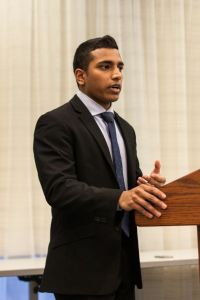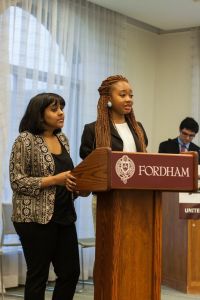
Nevin Kulangara, GSB ‘15 presented his platform in the USG debate this past Monday. (Josh Kim/The Ram)
By Connor Ryan
Days before United Student Government voting was set to open at Rose Hill, Nevin Kulangara, GSB ’15, stood a few feet from Tochi Mgbenwelu, FCRH ’15, in a large meeting room on the second floor of the McGinley Center as the two presidential candidates engaged in a cordial debate, seeking to sway the votes of the few students that sat before them.
Anisah Assim, FCRH ’16, stood beside Mgbenwelu as her running mate, often stumbling as she quickly moved through her talking points. Sarah Skrobala, FCRH ’15, who is currently studying abroad in Spain—where the local time was after midnight—was not video conferenced into the debate, leaving Kulangara to fend for himself.
Throughout the night, Kulangara looked to emphasize the fact that he and Skrobala had four and a half years of combined student government experience—more than the opposing ticket, which had accumulated two years. Mgbenwelu has never occupied an elected position at Fordham.
In response, Mgbenwelu said firmly that she believes it is not necessary for an incoming USG president to have experience within the organization. She highlighted the fact that while the Kulangara-Skrobala ticket may balance GSB and FCRH backgrounds, her ticket combines extensive club leadership experience and USG familiarity.
“I’ve been able to look from the outside in,” Mgbenwelu said of her perspective as a club leader. In addition, Mgbenwelu said that because Assim is currently a sophomore, the ideas that are developed within her administration will be able to live on after she graduates.
When Kulangara asked why she had waited so long before seeking a USG post, Mgbenwelu answered sternly.

Tochi Mgbenwelu, FCRH ’15 and running partner Anisah Assim, FCRH ’16, also verbalized their ideas in the debate.
“I didn’t wait,” she quipped. “I felt like it was the right time. I wanted to feel like I was qualified enough.”
Another point of discussion Kulangara sparked during the debate was the fact that his platform had specific, concrete plans about how his ticket would enact change on campus.
“Neither ticket is going to drive the organization into the ground,” Kulangara said in a diplomatic tone. “Neither ticket wants to abuse our power for personal benefit. But there are several differences between our tickets, and what we’ve communicated to you through our platforms.”
He continued: “Rather than just list vague goals and objectives, Sarah and I have a lot of achievable and feasible initiatives that contribute to our overarching goals.”
When asked, Mgbenwelu said she had no regrets about the relatively sparse platform she presented last week. “Specificity has been added,” she said, adding that the platform was not meant to be an accumulation of her ideas, but instead and invitation for other students’ ideas.
“I’m not doing this to add a couple of lines to my resume, but because when I see the opportunity for positive growth and change, I leap at the opportunity and I see that in USG,” Mgbenwelu said.
The two tickets seemed split on the question of whether USG has done enough for the student body. “I feel that USG right now is in a great place, and we’ve accomplishing a lot,” Assim said, adding that productivity can always be improved in the future.
But Kulangara said frankly: “I don’t think we pursue as many initiatives as we could. I think USG could serve more as an initiative-driven think-tank…There should not be senate meetings where you go through a body of 20 senate members and only hear 1 update.”
Mgbenwelu opened fire on Kulangara by asking what he would do to celebrate diversity on campus.
He seemed caught off guard, and ended his muddled answer by saying that it is important every voice on campus is heard.
A student from the audience also asked Kulangara about his commitment to diversity on campus, citing a recent article in The Fordham Ram about Fordham’s apparent lack of diversity seen in recent commencement speaker. Kulangara was quoted in the article.
“I don’t want it to seem like I’m not concerned,” he said. “It was a qualified statement. It was part of a quote that included the qualification. What I was saying was I’m not concerned as long as that process is as open as possible.”
It should be noted that Mgbenwelu has been endorsed by a number of cultural groups on campus, including: ASILI: The Black Student Alliance (of which she serves as president), Academia Hispania and Fordham University’s South Asian Entity (FUSE). Mgbenwelu is also endorsed by PRIDE and the Women’s Empowerment group on campus.
Kulangara has been endorsed by Mimes and Mummers, Fordham Fanatics, Finance Society, the Gaelic Society and The Fordham Ram among others.
In addition, he has won the endorsement of current USG president and vice president, Aileen Reynolds, FCRH ’14, and Brendan Francolini, GSB ’14.
“Nevin and Sarah have tactfully exemplified their experience through their platform, which outlines specific action steps they plan to pursue if elected on a wide range of areas of campus life,” the executive ticket said in a letter to The Fordham Ram. “Likewise, whether you have witnessed their participation in a meeting or you’re watching their undeniably humorous campaign video, their dedication to Fordham is clear and unwavering.”
